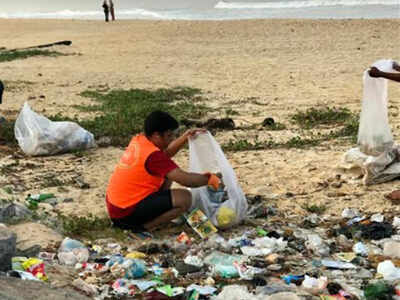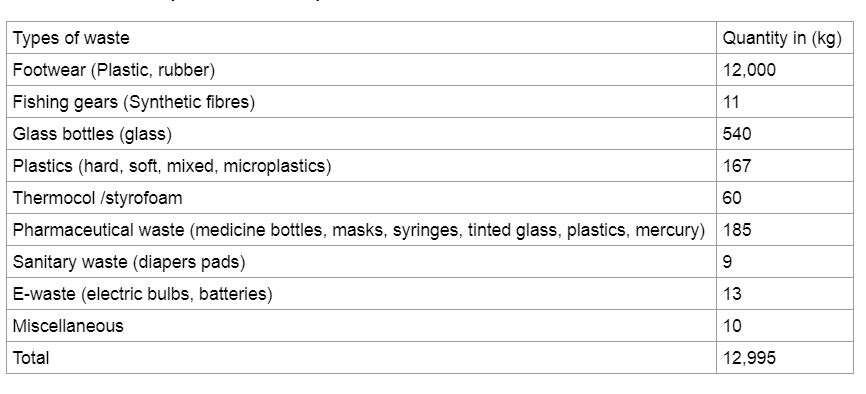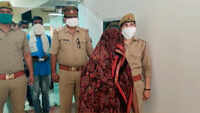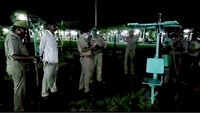
MANGALURU: A whopping 12,000kg of plastic and rubber footwear collected from a 200-metre stretch of Kodi beach in Kundapur on seven Sundays during November-December last year shows the devastating impact plastic pollution has on the ocean life.
The high pollution levels came to light thanks to the beach clean-up drive launched by Clean Kundapura Project along with FSL India. The revelations were also part of a report released by Reef Watch Marine Conservation. The volunteers of Kundapura Project also found bottles - PET, medicine and alcohol – in large numbers on the beach.
 *Source: Report on assessing the composition and impacts of marine debris at Kodi Beach, Kundapur
*Source: Report on assessing the composition and impacts of marine debris at Kodi Beach, Kundapur
The report, titled ‘Assessing the composition and impacts of marine debris at Kodi beach’ and compiled by Ashna Abi is an attempt to quantify and document the accumulated marine debris. The report also explores the scope of Extended Producer Responsibility (SWM Rules, 2016) to hold producers accountable for eco-friendly modes of disposal of their products.
According to Bharath Bangera, a volunteer of Clean Kundapura Project, the Covid-19 pandemic will also contribute to high levels of plastic waste in the waters around the world. Environmentalists across the world are now worried about surgical masks and gloves washing up on the shores in large quantities.
“Coastal zones in Dakshina Kannada district are thickly populated. Fisherfolk, tourists and local vendors generate different categories of waste which gets accumulated on the shorelines. Huge amount of garbage also comes from five rivers, including those from the neighbouring districts. We found that the waste gets accumulated at Panchagangavali river mouth,” Bangera said.
“Our team participated in over 60 weeks of beach cleaning drives. Pollution poses a threat to sea creatures which may consume plastic waste or suffer injuries due to glass bottles. There are chances of marine organisms getting entangled in abandoned fishing gears which could result in dissolution or discoloration of calcium carbonate shells due to ocean acidification,” he added.
The report bats for a comprehensive marine conservation policy. “Scrap dealers should be included in the chain of waste collection to ensure recovery and recycling of waste collected from the beaches. Collection and sale of accumulated marine debris should be treated as a source of livelihood,” it said.
The high pollution levels came to light thanks to the beach clean-up drive launched by Clean Kundapura Project along with FSL India. The revelations were also part of a report released by Reef Watch Marine Conservation. The volunteers of Kundapura Project also found bottles - PET, medicine and alcohol – in large numbers on the beach.

The report, titled ‘Assessing the composition and impacts of marine debris at Kodi beach’ and compiled by Ashna Abi is an attempt to quantify and document the accumulated marine debris. The report also explores the scope of Extended Producer Responsibility (SWM Rules, 2016) to hold producers accountable for eco-friendly modes of disposal of their products.
According to Bharath Bangera, a volunteer of Clean Kundapura Project, the Covid-19 pandemic will also contribute to high levels of plastic waste in the waters around the world. Environmentalists across the world are now worried about surgical masks and gloves washing up on the shores in large quantities.
“Coastal zones in Dakshina Kannada district are thickly populated. Fisherfolk, tourists and local vendors generate different categories of waste which gets accumulated on the shorelines. Huge amount of garbage also comes from five rivers, including those from the neighbouring districts. We found that the waste gets accumulated at Panchagangavali river mouth,” Bangera said.
“Our team participated in over 60 weeks of beach cleaning drives. Pollution poses a threat to sea creatures which may consume plastic waste or suffer injuries due to glass bottles. There are chances of marine organisms getting entangled in abandoned fishing gears which could result in dissolution or discoloration of calcium carbonate shells due to ocean acidification,” he added.
The report bats for a comprehensive marine conservation policy. “Scrap dealers should be included in the chain of waste collection to ensure recovery and recycling of waste collected from the beaches. Collection and sale of accumulated marine debris should be treated as a source of livelihood,” it said.

Coronavirus outbreak
Trending Topics
LATEST VIDEOS
City
 On cam: 7-ft-long crocodile rescued in Gujarat’s Vadodara
On cam: 7-ft-long crocodile rescued in Gujarat’s Vadodara  UP police arrest fake Anamika Shukla, teacher who worked simultaneously at 25 schools to earn Rs 1 crore
UP police arrest fake Anamika Shukla, teacher who worked simultaneously at 25 schools to earn Rs 1 crore  Video of 'ghost' exercising in Jhansi park goes viral, cops vow to host miscreants in 'haunted' lockup
Video of 'ghost' exercising in Jhansi park goes viral, cops vow to host miscreants in 'haunted' lockup  Delhi cop returns to his home state Arunachal Pradesh as a DSP
Delhi cop returns to his home state Arunachal Pradesh as a DSP
More from TOI
Navbharat Times
Featured Today in Travel
Quick Links
Kerala Coronavirus Helpline NumberHaryana Coronavirus Helpline NumberUP Coronavirus Helpline NumberBareilly NewsBhopal NewsCoronavirus in DelhiCoronavirus in HyderabadCoronavirus in IndiaCoronavirus symptomsCoronavirusRajasthan Coronavirus Helpline NumberAditya ThackerayShiv SenaFire in MumbaiAP Coronavirus Helpline NumberArvind KejriwalJammu Kashmir Coronavirus Helpline NumberSrinagar encounter
Get the app



